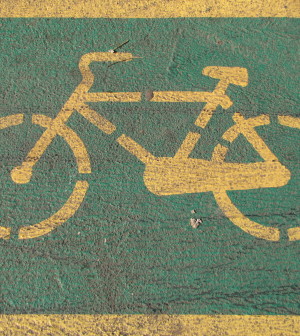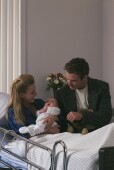- USDA Gets Tougher on Salmonella in Raw Breaded Chicken Products
- Fragments of Bird Flu Virus Found in 1 in 5 Milk Samples
- Clients Got HIV Through ‘Vampire Facial’ Microneedling Treatments
- Take the Stairs & Step Up to Longer Life
- ‘Drug Take Back Day’ is Saturday: Check for Leftover Opioids in Your Home
- Loneliness Can Shorten Lives of Cancer Survivors
- A Stolen Dog Feels Like Losing a Child, Study Finds
- Healthier Hearts in Middle Age Help Black Women’s Brains Stay Strong
- Better Scans Spot Hidden Inflammation in MS Patients
- Which Patients and Surgeries Are ‘High Risk’ for Seniors?
Study Finds Many Newborns Have Risky First Ride Home From Hospital


Many newborns are at risk on their first trip home from the hospital because their parents install or use car safety seats incorrectly, a new study warns.
Researchers looked at 267 families with newborns and found that 93 percent made at least one major mistake in positioning their infant in a car safety seat or when installing the seat in a vehicle.
The most common mistakes in positioning newborns included the safety seat harness being too loose (69 percent), retainer clip too low (34 percent), use of an after-market product not approved with the seat (20 percent), harness too high (18 percent) and not knowing how to adjust the harness (15 percent).
The most common safety seat installation errors were installed too loosely (43 percent), incorrect angle (36 percent), safety belt used but not locked (23 percent) and incorrect spacing between safety seat and vehicle front seat (17 percent).
Families most likely to make one or more major car safety seat mistakes were poorer, had less education, were not white, did not speak English and were unmarried or without a partner.
Families who had consulted with a certified car safety seat technician were 13 times more likely to install and use the seat correctly, according to the study to be presented Friday at the American Academy of Pediatrics (AAP) annual meeting, in San Diego.
“Car safety seats can be difficult to use correctly for many families, and we need to provide the resources and services they need to help ensure the safest possible travel for newborns and all children,” study author Dr. Benjamin Hoffman, medical director of the Tom Sargent Children’s Safety Center at Doernbecher Children’s Hospital in Portland, Ore., said in an AAP news release.
“We need to move beyond the idea that we cannot afford to develop and support child passenger safety programs. Car crashes kill more kids that any other cause; we can’t afford not to,” he added.
Research presented at medical meetings should be viewed as preliminary until published in a peer-reviewed medical journal.
More information
Safercar.gov has more about car safety seats.
Source: HealthDay
Copyright © 2024 HealthDay. All rights reserved.









